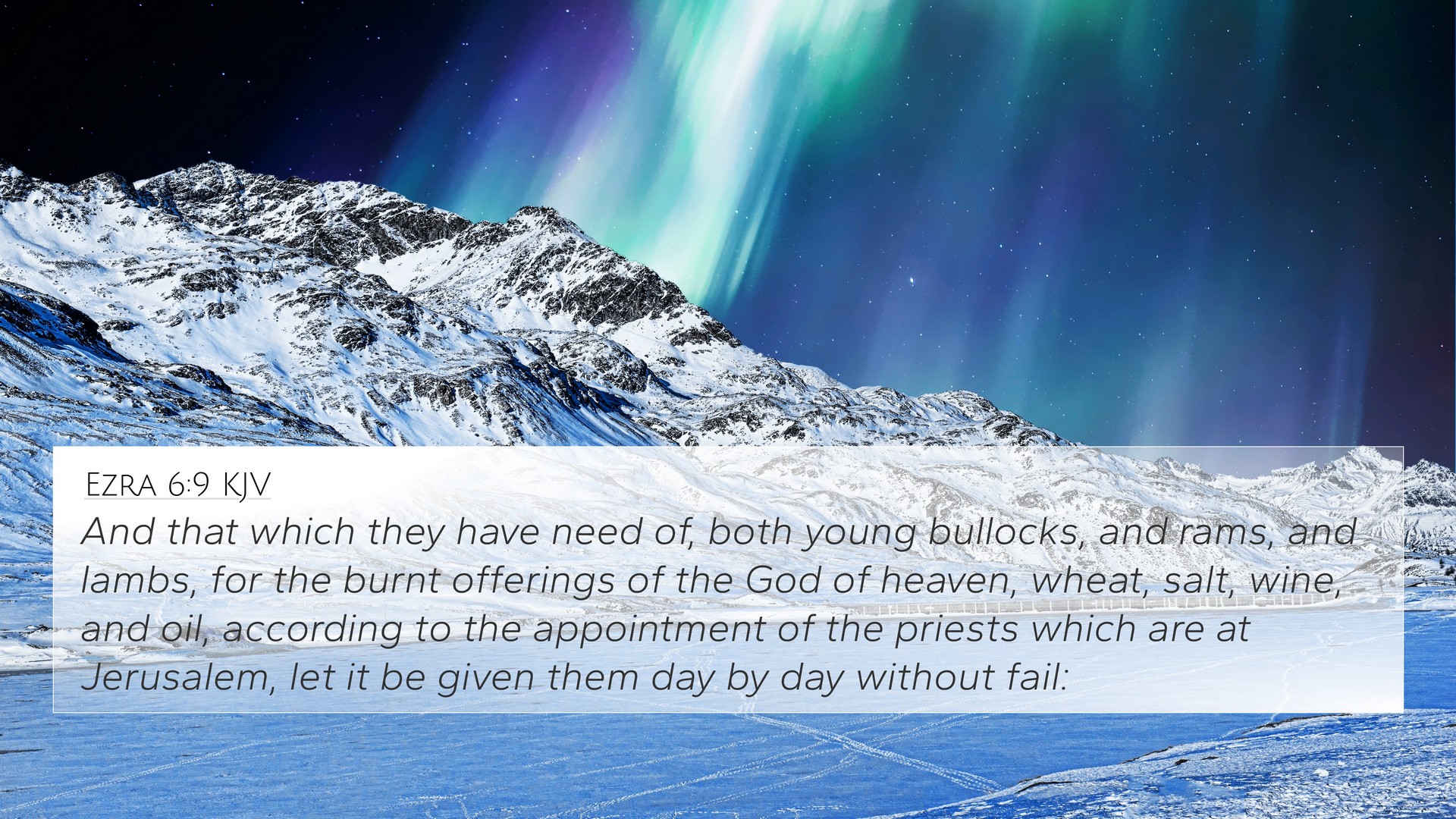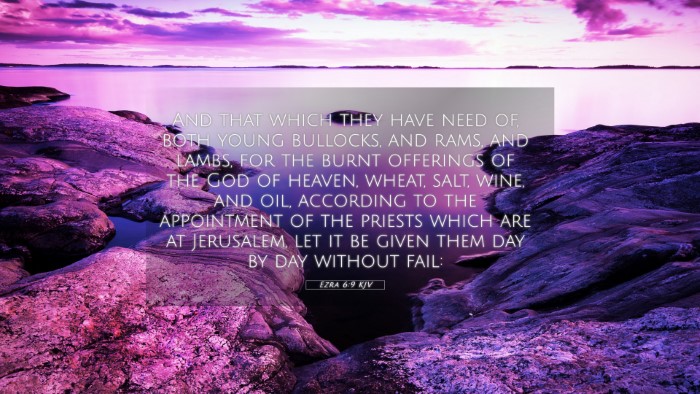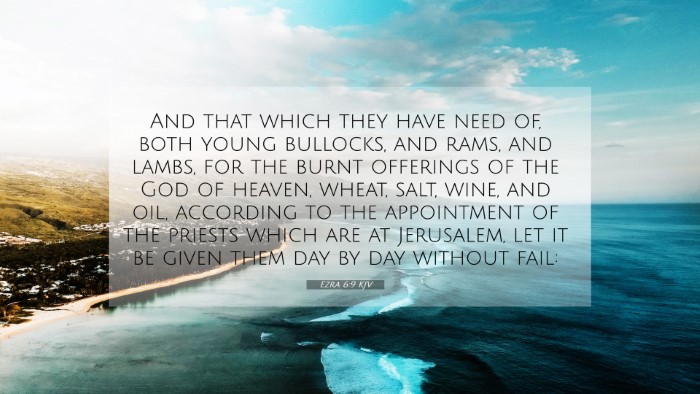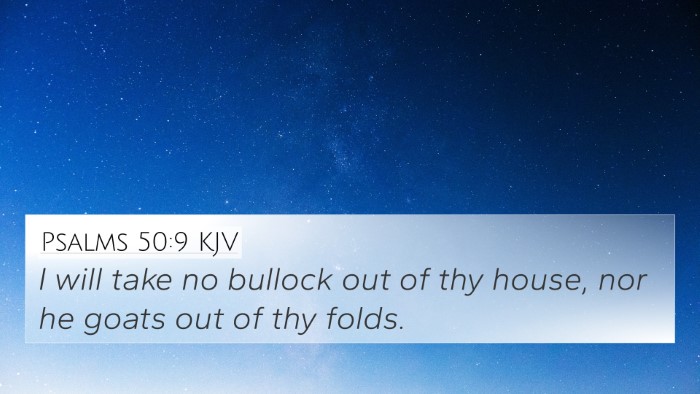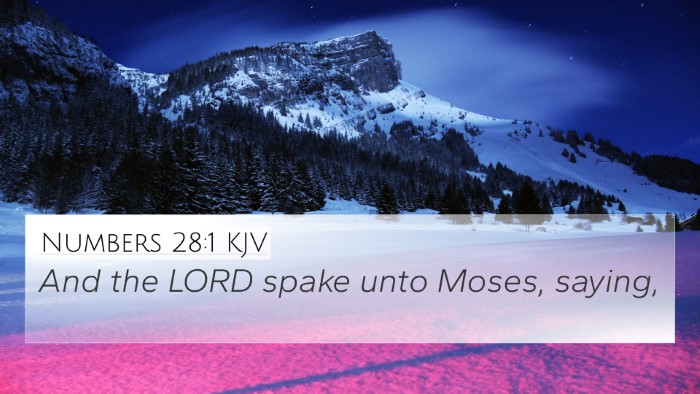Old Testament
Genesis Exodus Leviticus Numbers Deuteronomy Joshua Judges Ruth 1 Samuel 2 Samuel 1 Kings 2 Kings 1 Chronicles 2 Chronicles Ezra Nehemiah Esther Job Psalms Proverbs Ecclesiastes Song of Solomon Isaiah Jeremiah Lamentations Ezekiel Daniel Hosea Joel Amos Obadiah Jonah Micah Nahum Habakkuk Zephaniah Haggai Zechariah MalachiEzra 6:9 Similar Verses
Ezra 6:9 Cross References
And that which they have need of, both young bullocks, and rams, and lambs, for the burnt offerings of the God of heaven, wheat, salt, wine, and oil, according to the appointment of the priests which are at Jerusalem, let it be given them day by day without fail:
Uncover the Rich Themes and Topics of This Bible Verse
Listed below are the Bible themes associated with Ezra 6:9. We invite you to explore each theme to gain deeper insights into the Scriptures.
Ezra 6:9 Cross Reference Verses
This section features a detailed cross-reference designed to enrich your understanding of the Scriptures. Below, you will find carefully selected verses that echo the themes and teachings related to Ezra 6:9 KJV. Click on any image to explore detailed analyses of related Bible verses and uncover deeper theological insights.
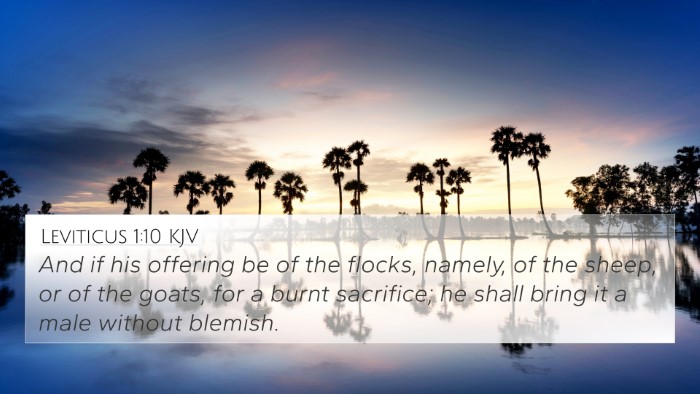
Leviticus 1:10 (KJV) »
And if his offering be of the flocks, namely, of the sheep, or of the goats, for a burnt sacrifice; he shall bring it a male without blemish.
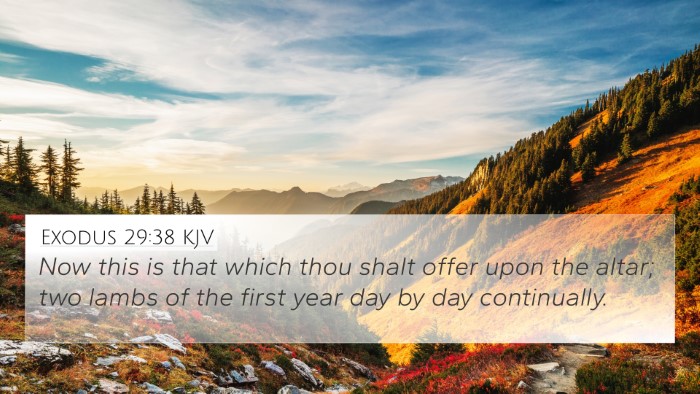
Exodus 29:38 (KJV) »
Now this is that which thou shalt offer upon the altar; two lambs of the first year day by day continually.
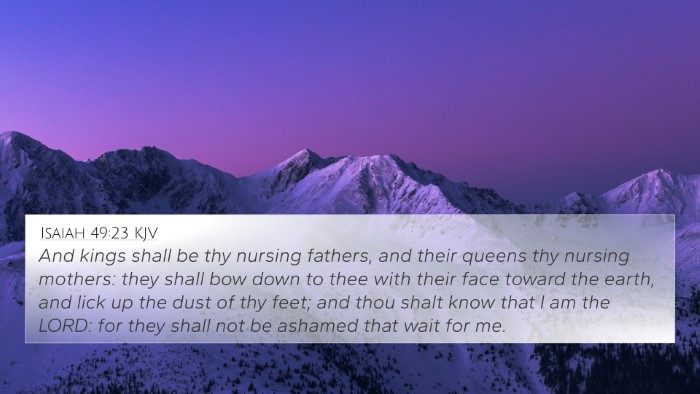
Isaiah 49:23 (KJV) »
And kings shall be thy nursing fathers, and their queens thy nursing mothers: they shall bow down to thee with their face toward the earth, and lick up the dust of thy feet; and thou shalt know that I am the LORD: for they shall not be ashamed that wait for me.
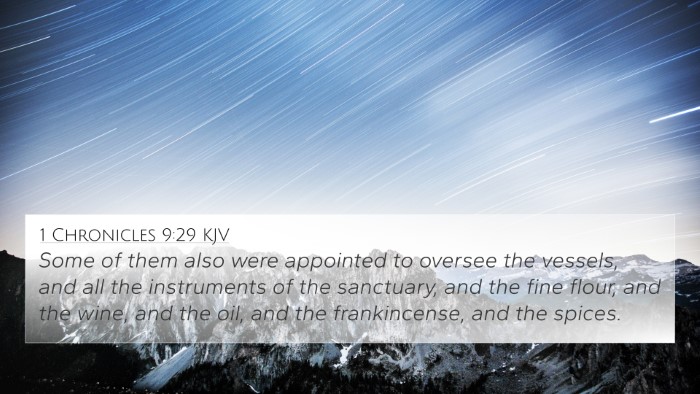
1 Chronicles 9:29 (KJV) »
Some of them also were appointed to oversee the vessels, and all the instruments of the sanctuary, and the fine flour, and the wine, and the oil, and the frankincense, and the spices.
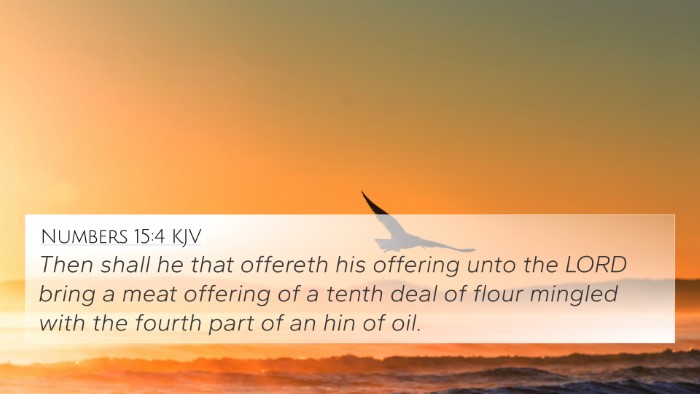
Numbers 15:4 (KJV) »
Then shall he that offereth his offering unto the LORD bring a meat offering of a tenth deal of flour mingled with the fourth part of an hin of oil.
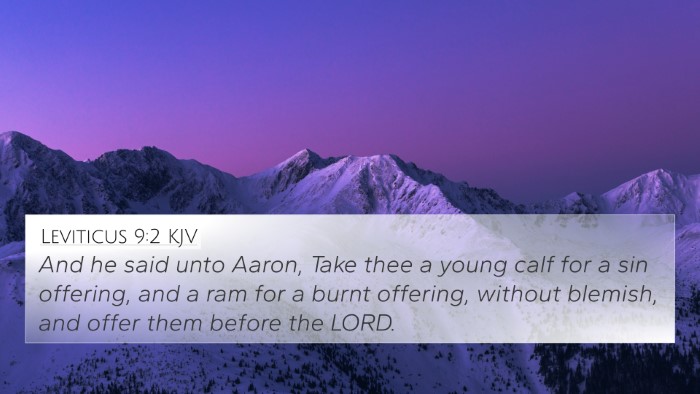
Leviticus 9:2 (KJV) »
And he said unto Aaron, Take thee a young calf for a sin offering, and a ram for a burnt offering, without blemish, and offer them before the LORD.
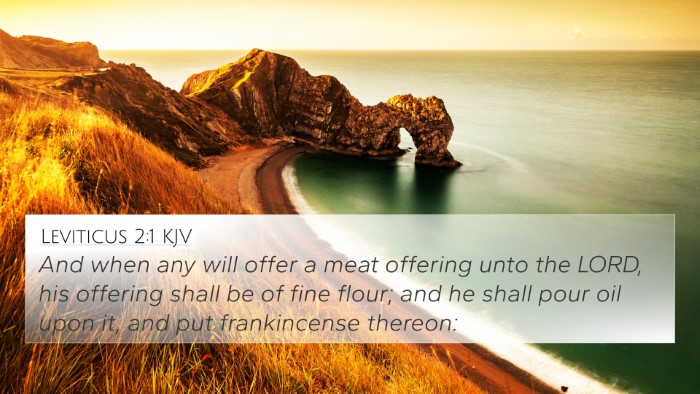
Leviticus 2:1 (KJV) »
And when any will offer a meat offering unto the LORD, his offering shall be of fine flour; and he shall pour oil upon it, and put frankincense thereon:
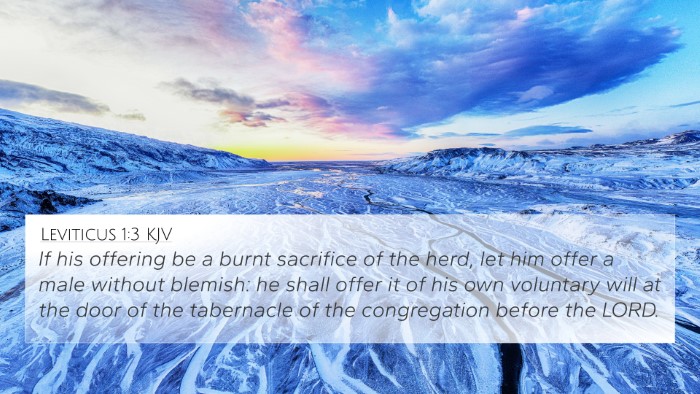
Leviticus 1:3 (KJV) »
If his offering be a burnt sacrifice of the herd, let him offer a male without blemish: he shall offer it of his own voluntary will at the door of the tabernacle of the congregation before the LORD.

Mark 9:49 (KJV) »
For every one shall be salted with fire, and every sacrifice shall be salted with salt.
Ezra 6:9 Verse Analysis and Similar Verses
Understanding Ezra 6:9
Ezra 6:9 states, "And that which they have need of, both young bullocks, and rams, and lambs, for the burnt offerings of the God of heaven, wheat, salt, wine, and oil, according to the appointment of the priests which are at Jerusalem, let it be given them day by day without fail." This verse is a part of the decree made by King Darius regarding the rebuilding of the Temple in Jerusalem after the Babylonian exile.
Context and Significance
The significance of this verse can be seen in the light of historical, cultural, and religious context. The Jews were coming out of captivity, and the rebuilding of the Temple symbolizes restoration and divine favor. The authorization for the provision of offerings emphasizes the importance of worshipping the God of Israel through the sacrificial system, which was central to their religious life.
Commentary Insights
- Matthew Henry: In his commentary, Henry emphasizes the theme of divine providence and support. He notes that the king not only allows the rebuilding of the Temple but also provides for the needs of the priests, showcasing God's care for His people.
- Albert Barnes: Barnes highlights the king's decree as a fulfillment of God's promises. He remarks on the significance of prayerful provisions and how God instills the hearts of rulers to support His work, asserting that the supplies serve to maintain the worship rituals as mandated in the Law of Moses.
- Adam Clarke: Clarke focuses on the list of offerings and their importance. He explains that these sacrifices are crucial to the covenant relationship with God, and the verse encourages the idea that God needs to be worshipped consistently and generously.
Bible Cross-References
This verse deeply resonates with several other scriptures providing a rich tapestry of understanding. Here are some relevant cross-references that help to expand its meaning:
- Exodus 29:38-42 - Details the daily offerings required by the Law.
- Leviticus 1:1-17 - Explains the burnt offering procedure, emphasizing the sacredness of offerings.
- Nehimiah 12:44 - Relates to offerings for the temple and the appointed priests.
- Daniel 9:17-19 - A prayer asking God to listen to His people, aligning with the needs presented in Ezra 6:9.
- Philippians 4:19 - "And my God will supply every need of yours," connecting God's provision for spiritual needs as seen in Ezra.
- Hebrews 10:1-2 - Discusses the insufficiency of the sacrificial system before Christ, contrasting the Old Testament with the New.
- Matthew 6:33 - "Seek first the Kingdom of God," reflecting the priority of worship as described in this chapter.
Thematic Connections
Exploring the connections between these verses provides insight into the themes of divine provision and the importance of worship. This verse exemplifies how the needs of worship are met by God through earthly means, signifying a continuous relationship of dependence on the Divine.
Tools for Bible Cross-Referencing
For further study, consider the following tools for effective cross-referencing:
- Bible Concordance: A great resource for looking up verses by keywords.
- Bible Cross-reference Guide: Helps in understanding the dimensions of scripture relationships.
- Cross-reference Bible Study: Engages deeper understanding through comparative assessments.
- Bible Reference Resources: Various online databases offer extensive cross-referencing options.
Conclusion
In summary, Ezra 6:9 is more than a logistical command; it reflects the covenant between God and His people. By using cross-references, we can see how themes of divine provision, worship, and restoration play out throughout Scripture. These connections deepen our understanding and highlight the importance of inter-Biblical dialogue for holistic interpretative efforts.
